Sleep
Work/Life/Sleep Balance
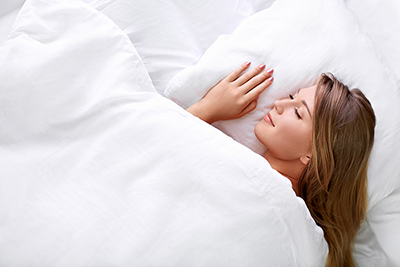
Strive for a work/life/sleep balance. The true order is sleep, life, then work...achieving good sleep habits makes work easier and life better! The importance of sleep is underestimated. The bravado associated with little or no sleep is endemic. Many do not sleep well or for long enough.
The Dream Diet

People looking to lose weight find it difficult to feel full, ignore cravings for unhealthy foods and exercise less if they are sleep deprived.
The demands of a modern lifestyle make it difficult to get adequate sleep and time looking at computer and television screens confuses circadian rhythms. Shift work and jet lag can result in sleep deprivation.
Sleep deprivation tends to make people eat more, gaining weight as a consequence. A tired brain turns to fattening foods and self-discipline wanes. Sleep is food for the brain.
Heavy Sleepers are Lighter on Their Feet
The more you snooze, the more you lose. According to a 2004 study, people who sleep less than six hours a day were almost 30% more likely to become obese than those who slept seven hours or more.When we combine the 4 basic elements: good nutritional habits, exercise and adequate sleep underpinned by a positive mindset we will experience optimal health and feelings of vitality.
Sleep Yourself Slim
Sleeping long enough and well enough may help shed unwanted pounds, based on a large study looking at this issue. Once you lose weight, the study suggests that getting adequate sleep may help maintain a healthy weight.
Sleep Yourself into Your Jeans

Key Points
- Hormones Control Appetite. Sleep deprivation has been associated with decreased leptin, an appetite-suppressing hormone, and increased ghrelin, an appetite-stimulating hormone. In the 2004 study that first sparked interest in this area, researchers found that restricting the sleep of healthy young men for just two nights led to changes in these hormones along with greater hunger and carb cravings. Later research has suggested that it might actually be the combination of sleep loss and stress that upsets the balance of appetite hormones.
- Late Nights Increase Snacking.
In one small study, people who slept only five-and-a-half hours nightly snacked more, particularly on high-carb foods, than those who stayed in bed longer. - Sleep Affects Ability to Lose Fat.
In another small study, overweight adults on a diet who slept five-and-a-half hours per night for two weeks lost less body fat and more lean body mass than those who slept longer. Sleep-deprived dieters also had a lower resting metabolic rate. - Tiredness Reduces Exercise Frequency.
Regular exercise promotes both weight loss and better sleep. For optimal sleep, the National Sleep Foundation recommends exercising at least three hours before bedtime, ideally in the late afternoon for most people. - A Healthy Lifestyle.
Balanced nutrition, regular exercise and adequate sleep are essential elements for optimal health.
Sleep and Mood
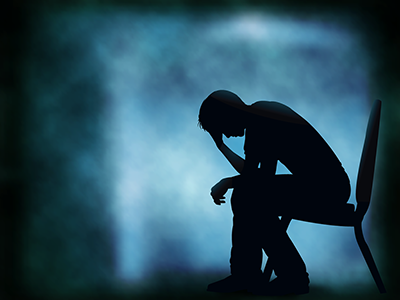
People who have problems with sleep are at increased risk of developing emotional disorders, depression and anxiety.
- Sleep and mood are closely connected; poor sleep causes irritability, good sleep promotes positivity.
- Chronic insomnia may increase the risk of developing a mood disorder, such as anxiety or depression.
- Poor sleep and feelings of depression or anxiety can be helped through a variety of treatments, beginning with improved sleep habits.
The Link Between Sleep and Mood
Following a sleepless night, we are irritable, short-tempered and vulnerable to stress, even partial sleep deprivation has a significant effect on mood.
Not only does sleep affect mood, mood and mental states affect sleep. Anxiety makes it difficult to sleep. Stress also affects sleep. Those under constant stress tend to have sleep problems.
Learn how to Stress Less.
If you feel anxious or depressed, look first at your sleep habits to improve the quantity and quality of your sleep.
Sleep improves mood and well-being.
Less is More
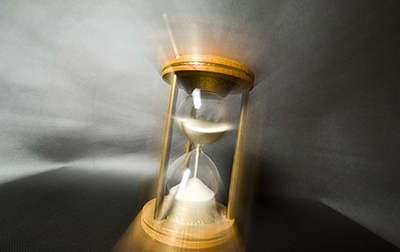
Embrace a holistic approach. Adolescents need adequate sleep to succeed at school; adults require sufficient sleep to achieve in work and experience life. Many find themselves overwhelmed by today’s fast paced life. The paradox: the best way to get more done is to spend more time doing less. New research shows that daytime workouts, short afternoon power naps, longer sleep hours, more time away from the office and longer, more frequent holidays boost productivity, job performance and health. Less is More.
Work Less, Sleep More
Time is finite; it is not that there are not enough hours in the day; we simply choose to squeeze too much in. We cannot increase the number of hours in a day, although we can increase our energy and be more productive. Like time, energy is finite; but unlike time is renewable. Taking more time off is counterintuitive. The idea challenges the prevailing work ethic, where downtime is typically viewed as time wasted. More than one-third of employees eat lunch at their desks.
Most workplaces reward those who put the hours in; that does not mean they are the most productive. Athletes understand the more intense their training, the greater the need for renewal. The importance of restoration is rooted in our physiology. We are not designed to expend energy continuously. We should pulse between exerting energy and recuperation.
Be Consistent
Most children have a regular bedtime, and although children need more sleep, adults benefit greatly from a regular bedtime. Develop good Habits.
Within weeks of keeping a regular sleep-wake schedule, you will have more energy. A consistent rhythm of sleeping and waking improves the quality of your sleep and quality of life.
The hour before bedtime is the most critical for good sleep.
A Sleep to Remember
During sleep your brain organises memories like a filing system, storing them in a more efficient and effective form for memory recall.
Sleep Glorious Sleep
Sleep is food for the brain.
The affects of sleep deprivation include:
- Slows down thought processes... we are less alert and not able to concentrate for a length of time. This hinders our ability to perform tasks that require logical reasoning or complex thought. Tiredness also impairs judgment.
- Impairs memory... research suggests the nerve connections that make our memories are strengthened during sleep. Sleep embeds what we experience over the course of the day into our short-term memory. Different phases of sleep play different roles in consolidating new information into memories. If sleep is cut short or disrupted, this interferes with these cycles. If short-term memory is affected, the information will not make it to the long-term memory.
- Makes learning difficult...by affecting our ability to learn in two ways. As concentration is diminished information is missed. Memory is also affected, which is essential to learning. Tired children can become hyperactive, which interferes with learning. Teenagers may lose focus and memory, affecting performance in school. Adults being the worst are at greater risk of metabolic syndrome, becoming less productive and their altered mood can damage relationships.
Sleep Boosts Sex Drive
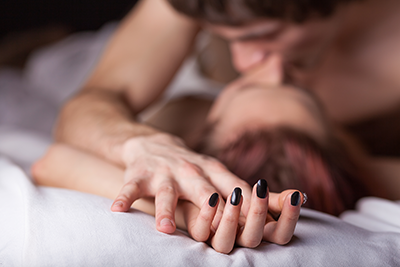
Sleep specialists say that sleep deprived men and women report lower libidos and less interest in sex. The bed is for sleeping or bedroom aerobics! The hormones released during and after orgasm (norepinephrine, serotonin, oxytocin, and vasopressin), oxytocin being most powerful helps both men and women fall asleep.
Hormones Released After Sex Prime Us for Sweet Dreams.
Beautiful Sleep
Sleep deprivation releases more of the stress hormone cortisol. In excess amounts, cortisol can break down skin collagen, the protein that keeps skin smooth and elastic.
Sleep loss also causes the body to release too little human growth hormone, which promotes growth. As we age, it helps maintain muscle mass, thicken skin, and strengthen bones.
During deep sleep (slow-wave sleep) growth hormone is released repairing tissues and cells.
Reduced sleep duration and quality appear to be endemic in modern society. Curtailment of the bedtime period to minimum tolerability is thought to be efficient and harmless by many. It has been known for decades that sleep is a major modulator of hormonal release, glucose regulation and cardiovascular function. In particular, slow wave sleep (SWS), thought to be the most restorative sleep stage is associated with decreased heart rate and blood pressure; improved sympathetic nervous activity and cerebral glucose utilisation. During SWS, the anabolic growth hormone is released while the stress hormone cortisol is inhibited.
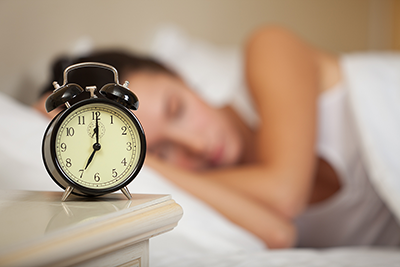
To minimise the negative effects of cortisol (known as the stress hormone) on our bodies ensure we get enough sleep (around 7-8 hours per night for an adult) in optimising our health and to burn fat. Since sleep becomes a fasted state, our body utilises fat as a primary fuel source. We are slimmest on waking. To allow the body and mind to recuperate completely, sleep in complete darkness away from electromagnetic fields, e.g. televisions, mobile phones, computers etc. Often when we feel constantly tired, we are not recuperating enough. Inadequate sleep and rest will cause a rise in cortisol secretion. When we feel this way, or maybe we notice mouth ulcers appearing or dark circles under our eyes, it is time to listen to our bodies and allow ourselves to rest and sleep. The reliance on caffeine to wake us up is a worldwide epidemic and a multi-billion pound business. Caffeine is a stimulant (drug) and increases our cortisol production, therefore should be used sparingly. If we require stimulants to wake us up, we are not allowing our body and mind sufficient rest and sleep.
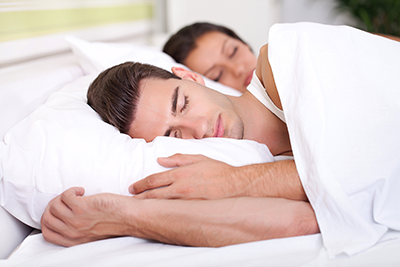
Sleep between 7 and 8 hours every night. Between 30-60 minutes after falling asleep our body produces twice as much growth hormone than in our wakened hours.
Of the many hormones synthesised during deep sleep testosterone is one; conversely sleep deprivation suppresses the release of these hormones. A study by V. H. Goh and T. Y. Tong presented in the March 2010 issue of the ‘Journal of Andrology’ tested the impact of sleep on testosterone. Their analysis showed a positive relationship between sleep duration and testosterone production, with longer sleep associated with greater testosterone.
The 10 Sleep Commandments
- Aim to get the ‘magic seven’ hours sleep each night and strive for the same bed time and wake up time every day, even on weekends for a consistent circadian rhythm.
- Practice a relaxing bedtime ritual. Your body needs time to drift into sleep; do something calming an hour before bed, like reading or listening to relaxing music.
- Design a relaxing sleep environment for a good night’s sleep, (e.g. comfortable mattress and pillows).
- Exercise daily. Study shows that people who exercise at moderate intensity experience relief from insomnia. Conversely exercising too late will not help falling asleep. Ensure exercise is concluded 2-3 hours before bedtime.
- Avoid bright light in the evening and seek sunlight in the morning.
- Avoid naps late in the day. An afternoon ‘power’ nap is rejuvenating...10-20 minutes at least 3-4 hours before bedtime does not usually interfere with circadian rhythms (aka ‘body clock’, a 24-hour cycle that tells our bodies when to sleep and regulates many other physiological processes).
- Avoid alcohol, caffeine and heavy meals in the evening. Alcohol at bedtime disrupts sleep: decreasing deep sleep and increasing broken sleep. Caffeine is a stimulant and can prevent falling asleep. Eat your last meal at least 2-3 hours before bedtime, as eating late can interfere with falling asleep. Our metabolism slows through the day; therefore food eaten later has less chance of being used as energy and more chance of being stored as fat.
- Avoid laptops and handheld devices before bed or in the middle of the night. Remove work materials, computers and televisions from your bedroom.
- When you cannot get to sleep, visualise to prevent the mind racing. If this does not work go into another room and do something relaxing until you feel tired.
- Use your bed for sleep and sex to strengthen the association between bed and sleep.
If difficulty sleeping continues consult your G.P.
Whenever you find yourself ready to nod off, stop what you’re doing and go to bed!
SLEEP
